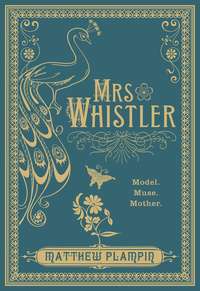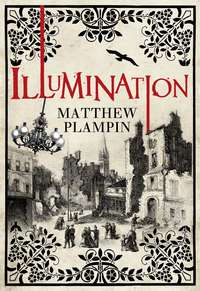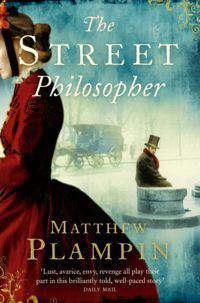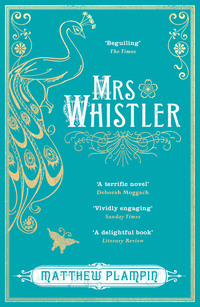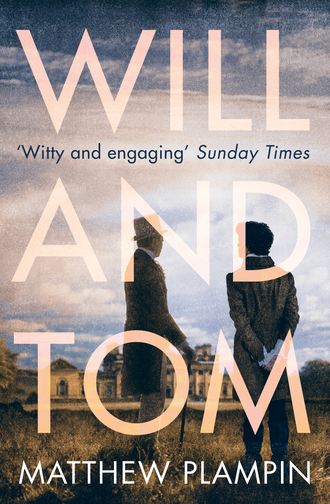
Полная версия
Will & Tom
Do not take fright, he tells himself, striding towards the very faintly smirking footman. Do not. You were invited here. This man wishes to see you – to give you patronage. You have to grow used to this, to the toadying, to the bowing and chattering and incessant smiling. It is part of painting. You have to master it.
Will enters a library. Tall white pilasters flank shelves loaded with gilded volumes; above is another of those staggering ceilings. At the other end of the room – and it is at least thirty feet in length – four gentlemen are roaming around a billiard table, engaged in a boisterous argument over some point of play. Cues are waved in the air and brandished like rapiers; insults are exchanged with jocular relish.
‘I call a two-ball carom – a two-ball carom – and no soul on God’s earth but this bounder here could possibly deny it were so!’
‘It ran wide, I tell you! That shot, you damnable villain, that shot struck my cue ball only!’
Three ladies are half-watching this overblown dispute from a suite of delicate furniture, away in the early evening shadows at the back of the library. Another is off on an armchair, closer to Will, apart from the company – on purpose, it seems. All are dressed at the height of aristocratic fashion: pastels and greys, silks and satins, festooned with frills and a glittering variety of ornaments. The ladies also hold their fans, and both sexes have been dusted liberally with hair powder.
Will Turner, born and raised on Maiden Lane, has landed among the bon ton. He experiences a new spasm of self-consciousness, a crumpling, contorting sensation in his stomach that quite paralyses him. Brown and plum! he thinks. You look like a parson, for God’s sake, next to these people – a plain little dumpling, simple and poor, brought in for general ridicule. He is relieved, though, that he opted to leave his sketchbooks downstairs. That was the correct decision. It would have cast him as a tradesman, coming to call with his samples – of no more significance than a fellow touting wallpaper or curtains.
Edward Lascelles the younger, known to his intimates as Beau, is one of the four gentlemen at the billiard table. Clad in a coat of mulberry velvet, his fleshy face is warmed by exertion and hilarity. He is trying to speak, to make a riposte; but then a new joke is broached and the laughter resumes. Will wonders what exactly he is to do. No one seems to have noticed his arrival. He glances back through the doorway, at the motionless footman out in the hall. Weren’t the servants supposed to announce you? Wasn’t that the usual form?
A figure slides from beside one of the windows and approaches the billiard table. It is Mr Cope, the valet from earlier; he touches Beau’s shoulder, just once, and has his master’s immediate attention. A few words are murmured. Beau looks over with evident satisfaction, then passes Cope his cue and starts towards this latest guest.
Will orders his thoughts. He is to talk with his patron at last. Terms can be laid down, a contract agreed. This visit can be given its proper purpose. He makes the bow he has practised: tidy and brief, one foot drawn back, an arm held momentarily across his waist.
Close sight does not inspire confidence. The heir to Harewood has a decent frame – Will’s eyes are level only with his Adam’s apple – but he’s rather plumper than Will remembers, a globular belly nestled comfortably within his well-tailored breeches. His hair, powdered to the uniform smoky tone, has been crafted into a dense cap of curls, each one carefully teased out and arranged to create an impression of graceful, manly nonchalance. Beneath are full cheeks, coloured with just a fleck of carmine, Will reckons – he knows from Father’s shop that plenty of gentlemen still use it – a protuberant chin and small, hooded eyes. His expression, his bearing, every single aspect of his person, is shot through with a sense of easy dominion, over Will and the rest of humankind: a dominion brought about and upheld by the all-conquering power of cash.
Will feels a pang of disgust. He wishes himself in his painting room, amidst its smells of damp, coal-smoke and mice, cork pellets pressed in his ears and a drawing taken from one of his Buttermere sketches clamped to the stand before him. He stares, unblinking, fighting the sensation down. It passes.
‘My dear Mr Turner,’ Beau begins, ‘how you must loathe me!’
Will’s eyebrow twitches; he opens his mouth to speak. ‘I—’
‘Such short notice, such a steep imposition, such an interruption to your plans! Yes, you must positively loathe me – but I remain, for my part, unapologetic, so very glad does it make me that you were able to join us.’
Will inclines his head. ‘A—’
‘Determining your itinerary was straightforward enough, out among the landscapists of London, along with the address of your tavern in York. I confess, though, that I was not hopeful. I had convinced myself that you would cast my letter on the fire and forget it at once.’ Beau takes Will’s left shoulder, enclosing the joint with his hand. ‘But here you are. Here you are, by Jove!’
The hand squeezes; Will wants very much to shrug it off. Beau’s last remark strikes him as profoundly disingenuous. The Lascelles fortune is such that any young artist would give a finger to win their benefaction. He stays quiet.
Beau looks to Mr Cope, who is back by his window. ‘I trust that your accommodation is adequate? I’m afraid that we are rather full at present. This house, Heaven protect her, is not so spacious as might sometimes be desired.’
Will considers this. Harewood can surely hold more than are gathered in the library. Others must be upstairs. He shifts, his new shoes squeaking, and clears his throat. ‘Perfectly,’ he replies. ‘My needs are few, sir, in truth.’
There is an unfriendly cackle from the billiard table; off in the shadows, fans flutter open to hide smiles. The cause is obvious. Will sees that he should have given more time to smoothing out his accent and rather less to buffing his buttons.
‘So, Lascelles,’ says one of the gentlemen – another well-fed specimen in a coat cut just like Beau’s but the colour of lemon curd, ‘this must be your cockney project.’
An odd word to select. Will senses an objection building inside him; again, he quells it, keeping his face as blank as he can manage. Project may imply a refashioning, as if he is somehow inadequate in his current form – but it also clearly indicates an intention to invest. Be patient, he instructs himself. Wait for the terms.
Beau is grinning, doubling the number of chins that quiver upon his collar. ‘If you were any less of a philistine, Purkiss,’ he declares, ‘you’d be aware that Mr Turner here, despite being scarcely out of boyhood, had two fine oils shown at the Academy Exhibition, and as many drawings in watercolour. He is a veritable phenomenon.’
‘Four,’ Will corrects – taking care to say forr rather than fowah, as he might in other circumstances. ‘Beg pardon, sir, but it was four drawings.’
Beau pauses for a moment, deciding how much license he will allow. ‘Of course,’ he concedes. He releases Will’s shoulder. ‘Views of Ely Cathedral, if I recall correctly, and quite divine.’
‘Salisbury,’ murmurs Will, but he is not heard; Beau has turned about and is strolling to the billiard table.
‘I found Mr Turner, would you believe, in the house of a mad-doctor – one Thomas Monro, an illustrious fellow indeed within his field. He was prominent among the party of physicians assembled to minister to our King, God save him, during His Majesty’s most recent deterioration.’
Beau’s manner had grown confidential while revealing this sensitive yet impressive detail; once it is out, though, and Monro’s cachet established beyond question, he moves briskly onwards. Discussing the royal travails is not thought patriotic.
‘The good doctor is a collector, and a devoted friend to the arts. He has a villa on Adelphi Terrace, from where he conducts a copying society – an academy, you might call it. On certain evenings, I have seen upwards of a half-dozen young draughtsmen at work in his rooms, setting down their own versions of drawings and prints from Monro’s albums. It is a fascinating undertaking for anyone interested in the visual arts in England, and several noble connoisseurs number among the doctor’s regular visitors. Viscount Malden introduced me there, in fact.’ Beau’s voice becomes mocking. ‘You know Malden, don’t you, Purkiss?’
The gentleman in the lemon-curd coat levels his cue, returning pointedly to the billiards game. His complexion, beneath whatever cosmetics have been applied to it, is pock-marked; the bulb at the end of his nose is cleaved like the cheeks of a tiny bottom. ‘No need to revive that old tale, Lascelles,’ he says, ‘in front of the ladies and all.’
This embarrassment is false. Mr Purkiss is perversely proud of whatever Beau is about to reveal. A lively back-and-forth ensues, drawing guffaws from the other two gentlemen and disapproving sighs from the ladies. Will learns that on one infamous occasion, while staying at Viscount Malden’s country seat at Cassiobury Park, Mr Purkiss embarked on a brandy-fuelled rampage across the formal gardens, under the impression that the peacocks purchased to strut thereabouts were intended to serve as game. The conclusion was predictable: iridescent feathers strewn over the lawn, the Viscount’s young children wailing at windows and a dead bird crushed in a flowerbed, buried beneath their father’s insensible guest.
Will, still standing, is forgotten completely. Mr Cope snags his eye and gestures discreetly to a chair. It is a fancy thing, all scrolls and flourishes, painted a soapy green with cushions of pink satin. Will sits as naturally as he can, flapping up the tails of his jacket. He is close to the lone lady, the one who appears to have deliberately isolated herself from the party. A sidelong glance reveals that she is younger than the rest of them – who range, by Will’s estimate, between thirty and forty years of age – being no more than twenty-five. She slouches in her chair with none of the poise affected by the other women. Her legs are crossed inside her loose fawn gown, a silken slipper dangling from her toe. There is a clear familial resemblance to Beau, the eyes heavy-lidded, the nose straight, with the same generosity of figure; it fits her better, though, Will decides – lending her a sleek, almost classical quality, akin to the larger women of Tiziano, or Peter-Paul Rubens – and she is hugely, aggressively bored. No notice whatever is granted to the artist seated beside her. Will summons his knowledge of the Lascelles family, gleaned from the portrait commissions they have made. This is surely Mary Ann, Lord Harewood’s younger daughter.
It won’t do to sit there mutely. Will knows that he has to talk; to ingratiate and flatter. He draws breath, makes an introduction and asks Miss Lascelles if her father is at home. She says that he is not, and nothing more – neatly snipping this first, somewhat feeble line of discourse and dropping them back into silence.
Will girds himself to try again. The library is growing quite dark now, but he opts nonetheless to undertake an assessment of the paintings displayed above the bookshelves and in other suitable places. These are Grecian in character, simple decorative pieces done without use of local colour or atmospheric effect; hack work, basically, and too late he realises that he must admire them, yet cannot hope to sound remotely sincere whilst doing so. He is growing tongue-tied when Miss Lascelles interrupts him.
‘You are well used to praise, aren’t you, Mr Turner? You rather expect it, I think.’
Her voice, in contrast with her careless pose, has a tart refinement, suggestive of governesses and tutors, private balls and carriages, the best of everything. Will begs her pardon.
‘Just then, when you were talking to my brother – he called you a phenomenon, for goodness sake, and you gave next to no reaction. You are accustomed to people falling at your feet. Lauding you to the heavens.’ She looks away. ‘I would worry, if I were you, that it had made me proud.’
A bristling heat blooms across Will’s face and closes around his throat; he turns a little in his chair. There are no thoughts or words within him, only a sense of having reached a boundary beyond which he cannot proceed. He feels the usual impulse to retreat, to plan and prepare, to seek the advice of more experienced men. This can’t be done, of course. He needs to meet this bizarre slur with modest good humour, a deferential quip; but the precise remark required, the sentiment he has to frame, eludes him utterly.
Someone enters the library and begins to speak over the billiard-table prattle in the assertive yet respectful tone of a senior servant. It is Mr Noakes, resplendent in livery of emerald green and gold, the tie-wig from his basement office perched atop his head, come to announce that dinner is served. The ladies rise, the gentlemen lay down their cues and an informal procession saunters off into the palatial hallway. Will lifts himself from the soap-green chair, his shirt peeling clammily from his back. He glances out at the blue shadows of the park with vague longing; then he mops his brow on his sleeve and falls in behind.
*
The dining table is oblong, with a chair at one end and four down each side. Beau claims the head with a swagger and beckons for Mr Purkiss to sit at his right hand. The others slot in around them, in seconds it seems, leaving but one place vacant. It is as far from Beau as the arrangement will allow.
Mary Ann is opposite. Her appeal, Will finds, has quite vanished; slovenly is the word that comes to mind now. The blankness that beset him in the library has also gone. He itches to tell her that he has never, never once in his life, received undeserved praise, and name some of the notable connoisseurs and newspaper critics who have singled out William Turner for special attention. But, thinking of Father, he holds his peace. It would become an eruption, for certain; and an eruption at Harewood, directed at a member of the baron’s family, would do him no favours at all.
The candles have been lit, perhaps three dozen of them – grouped along the table, set before massive, gilt-framed mirrors, positioned upon every available surface. This creates an extraordinary level of illumination, and makes the dining room disagreeably warm and airless despite its cavernous size. Beau orders the windows opened, admitting a barely perceptible breeze; and, soon afterwards, a horde of biting insects. During the entrée a papery moth hurtles in, butts against a candle and bursts into flames, prompting shrieks and exclamations as its smoking, flapping body spirals to the tablecloth. At once, a servant is on hand to dispose of it.
Will eats mechanically, scarcely registering the series of fussy, Frenchified dishes that are placed before him. Burying his puzzlement, he thinks only of the conversation he might make. Nothing comes, though: no topics, no opportunities. The company moves seamlessly from one society scandal to the next, an animated parade of disclosures, dropped names and allusions, interspersed with peals of nasty laughter. He forces a grin at a couple of Beau’s jokes, and even at one of Mr Purkiss’s – feeling a pinch of self-loathing as he does so.
Across the table, Mary Ann sets about her dinner with gusto, but otherwise manages to sustain her air of disconnection and ennui. This is not permitted for long. Her brother and his comrade begin to goad her, prodding and jibing, trying to draw her out by recounting details of nocturnal antics back in London.
‘Four o’clock in morning, was it, before the fair Miss Lascelles deigned to return to Hanover Square? And was she really quite alone?’
‘Indeed she was, dear Purkiss – and what’s more, her gown appeared to have lost a number of, ah, crucial components over the course of the evening’s revelry. Why, it was hardly sufficient to cover her person. Some slight recompense for the coachman, I suppose!’
Mary Ann merely rolls her shoulders like a sulky cat, much to her tormentors’ amusement. Then a lady’s voice bids Beau to leave her be – and reminds Mr Purkiss, none too fondly, that he is a guest at Harewood. The speaker, who has contributed little up to this point, is sitting further down the table on Will’s side. He tilts back in his chair for a surreptitious survey. Although leaner and a shade more severe, she too is plainly a Lascelles. Will gathers from the gentlemen’s apologies that this is Frances, the baron’s eldest child. Mary Ann is annoyed by her sister’s intervention; she lays a fork down noisily on her empty plate.
Will watches a spindly insect drift over the central candelabrum, lifting an inch or two in the flames’ heat, and fits together a theory. The younger daughter is in disgrace. There has been a liaison during the spring, a grave blunder on her part, and it has ended badly both for her and her family. She is at Harewood as a punishment, under Frances and Beau’s wardship, exiled so that memories of her misadventure can fade. This would account for her demeanour – and for her harsh treatment of wholly innocent house guests. Why her brother would refer to this matter before him, however, and these others to boot, and so lightly, is past Will’s comprehension; unless, like so many of his type, Beau Lascelles has simply never learned to think better of a bit of drollery.
Firmly, Frances moves them on – asking another of the gentlemen, a slim, bland-looking fellow who Will perceives is her husband, to tell the table of an encounter he’d had the previous week with the Prince of Wales. The gentleman, addressed by all as Douglas, is glad to co-operate. It was at Almack’s, he reveals – where, during a conversational hand of piquet, he informed the prince of his connection with Harewood and its family.
‘His Majesty gave a laugh, looked to his friends and declared, in that winning way of his, that the last time he’d heard the name Lascelles it was being mistakenly applied to him.’
The similarity said to exist between Beau and the prince is quite famous. Will has observed George on two occasions, waddling around the Academy Exhibition; their likeness, in his view, is one only of overfed complacency. Beau, though, grown loud with wine, cannot conceal his pleasure. The prince remembers his name, who he is! To enjoy such an association with royalty, to edge past obeisance towards proper familiarity, is the fervid dream of every aristocrat – especially those lodged on the lower rungs of the noble ladder, as the Lascelles undoubtedly are.
The company – Mary Ann excepted – attempts to be impressed by Douglas’s tale. An awkwardness persists, however; and before ten more minutes have passed, Frances gathers in her silken shawl and rises from her chair, giving the ladies their cue to depart. Her sister is away immediately, rushing around the table in a wide circle and off through a door at the back of the room. The two other women follow at a more leisurely pace, arms linked, sharing a whispered joke that Will suspects is at Mary Ann’s expense. Frances is equally unhurried, but she sweeps rather than strolls – stopping by a sideboard to murmur an order to the ever-present Mr Cope. He bends down to offer his ear, then nods once in obedient understanding.
The door closes behind her, to a collective release of breath. Costly jackets are removed, wrapped into balls and hurled aside; waistcoats are unbuttoned; sweat-sodden shirt-tails are wrenched free from breeches. Servants bring in crystal brandy decanters, large tumblers and trays of sweetmeats, folding back the tablecloth to set them upon the polished wood beneath. Intrigued, Will leans forward to scrutinise the jewel-bright confections – selecting one that is a rich raspberry red and moulded in the shape of a conical sea shell. He gives the point a cautious nibble; the soft, jellied flesh dissolves instantly, flooding his mouth with a taste of summer fruit so succulent and intense that he nearly blurts out an oath.
Beau wishes to clear the air. ‘Gentlemen,’ he says, ‘please tell me that you are far too wise to pay any mind to that saucy talk concerning my younger sister.’ He props a foot on the empty chair to his left. ‘None of what we said was of any consequence. God knows, Mary Ann has had a miserable time of it lately. I’m sure you’ll have heard the rumours – the scurrilous stories that swirl about London. It was not gallant of us to wave it before her up here as well.’
The others indicate that they understand Beau and Mr Purkiss spoke only in jest – Douglas adding that his wife was damnably prone to over-reaction where her sister was concerned. Will, for all his theorising, has heard none of these rumours about Mary Ann. Keen to learn more, he wonders how best to assure his host of his discretion.
Mr Purkiss is watching him, his pocked face heavy with contempt. ‘An appropriate moment for you to withdraw, Mr Turnbull, wouldn’t you say?’
Will looks to Beau. He is swilling brandy around in a tumbler; he makes no objection, not even to the error regarding Will’s name. A silence settles upon the dining room. These fine gentlemen will say nothing else while the painter is present. He is being dismissed.
There is a second or two’s numbness while Will fully apprehends what is happening – and then a jolt of furious, dizzying energy. Lips pursed hard, he clambers from his chair like a man dismounting a difficult horse. The plum waistcoat has gone awry and one of his stockings is coming loose from his breeches. He doesn’t attempt to adjust them. Drawing himself up, he announces that he will retire for the evening – adding, a little more pointedly than is politic, that he has much work to do. A cursory bow and he is off across the carpet, accelerating shoe-squeaks marking his progress to the door.
The music room beyond is far darker, lit by only a triple-stemmed candelabrum placed atop a pianoforte. Will slows, feeling a gummy sensation in his right palm: the remainder of the shell-shaped sweetmeat, carried with him from the table, is starting to liquefy against his skin. All appetite gone, he looks about distractedly for somewhere to dispose of it.
His mind teems with unpleasant questions. Was he asked here specifically to be mistreated? It’s beginning to feel deliberate. Has he perhaps offended Beau in some way, or connected himself inadvertently to an enemy of the Lascelles? Is this all, in short, a trick? Have they dragged him out to Harewood in order to avenge a slight received during the season, in a London drawing room or pleasure garden? Will has grown up listening to the ton talk in Father’s shop, gossiping unguardedly while they were shaved. He knows very well how they delight in their cruel games and obscure vendettas – in wreaking precisely this kind of humiliation. The only rational course for him is to leave, at first light if not that same evening. He makes for the hall door.
‘Mr Turner.’ It is Mr Cope, back at the entrance to the dining room. ‘One moment, if you please.’
Beau saunters through. He glances at his valet with mild resentment, like a man forcibly parted from his brandy and the company of his friends; but, nearing Will, he plasters on a rueful smile.
‘My apologies for Purkiss, Mr Turner. The fellow is brusque as a baboon, really he is. And I am sorry, also, if I have appeared inattentive – not the case, I assure you. It has been a trying day for everyone at Harewood. Relocation, on the scale that we must perform it, is so very taxing. The clothes alone, great Jupiter …’ He sighs, weaving drunkenly into a window alcove. ‘I have been busy these past months, furthermore, in the auction rooms – specimens of finest porcelain, you understand, cast in the workshops of poor King Louis and several of his departed courtiers. Nothing that would be of interest to you, I daresay, but it must all be unpacked under close supervision. The servants simply cannot be relied upon to—’
Will has had enough. ‘I want my terms, Mr Lascelles. Your letter let me believe that it was drawings you were after, drawings of your house. So I want my terms, sir. What views you’d have me do, and the money involved.’


